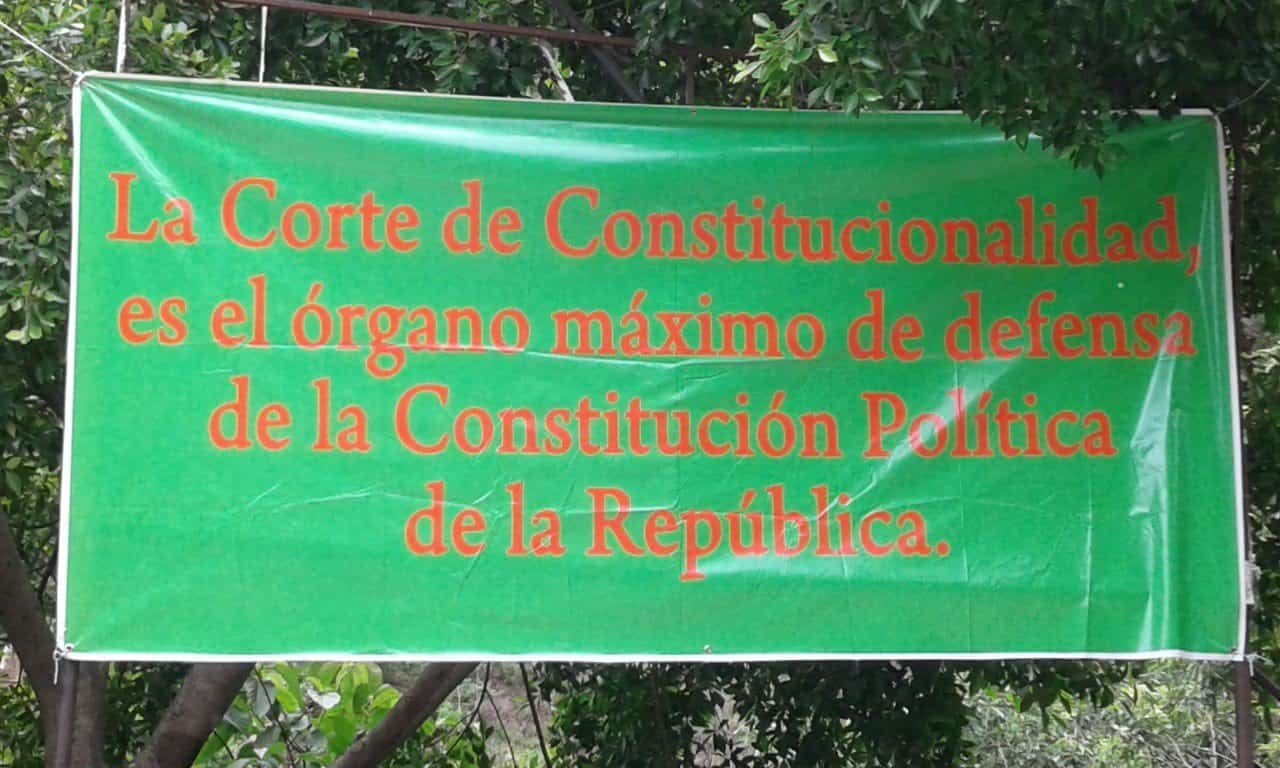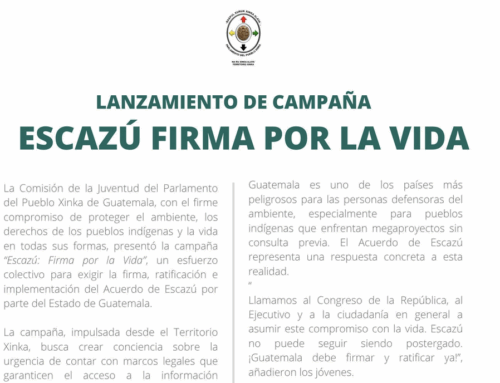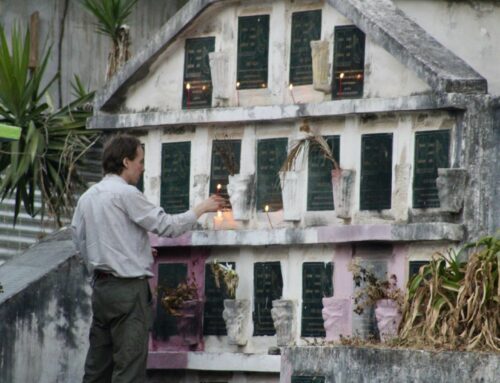[English below]

The Constitutional Court is the highest body of defense for the Political Constitution of the Republic. (Photo: La Asamblea Departamental de Pueblos de Huehuetenango- ADH)
Alta Corte de Justicia de Guatemala
Las instituciones internacionales de derechos humanos firmantes expresamos nuestra profunda preocupación ante una ofensiva en curso que promueve un golpe contra la independencia de la máxima instancia judicial de Guatemala. Esta acción es lo más reciente y descarado de una serie de acciones en las últimas semanas que demuestran con claridad que redes criminales de corrupción están lanzando un ofensivo para consolidar control del organismo judicial de Guatemala.
El día 26 de junio, usurpando funciones de la Corte Suprema de Justicia (CSJ), una sala ilegal publicó una resolución fraudulenta que autorizó al Congreso de la República iniciar un proceso de antejuicio en contra de cuatro magistrados de la Corte de Constitucionalidad (CC) – Gloria Patricia Porras Escobar, Neftaly Aldana Herrera, José Francisco de Mata Vela, y Bonerge Amílcar Mejía Orellana.
La resolución ilegal de la CSJ responde a una resolución de la CC con fecha 6 de mayo del 2020 en relación con el proceso de nombramiento de los magistrados que integrarán la nueva CSJ. La CC otorgó un amparo presentado por la Fiscal General de Guatemala en contra de acciones del Congreso Nacional de la República que la Fiscal General valora como ilegales y como amenazas inminentes. La resolución fraudulenta de la CSJ razona que en dicha resolución los cuatro magistrados de la CC habían interferidos en las funciones que la Constitución confiere al Congreso cuando ordenó que el Congreso “debe excluir del proceso de elección a aquellos profesionales cuya idoneidad y honorabilidad esté comprometida, derivado de los hechos notorios denunciados por la peticionante del amparo.”
Con esta frase, la CC repite casi textualmente el contenido de las leyes que regulan los procedimientos de nombramiento de magistrados de la CSJ, demostrando que la resolución fraudulenta que promueve la persecución penal de los cuatro magistrados destacados de la CC no es nada más que un burdo intento de golpe técnico en contra de uno de los pilares fundamentales de la democracia en Guatemala.
El amparo que había presentado la Fiscal General de República solicitó la intervención de la CC para frenar acciones ilegales en curso dentro del Congreso, alegando que, en el procedimiento de nombramiento de candidatos a magistrado de la CSJ que el Congreso actualmente realiza, el Congreso había incumplido en la obligación de asegurar que los propuestos magistrados cumplen con los procedimientos legales que regulan el proceso . El Congreso de la República actualmente obstaculiza la elección de nuevos magistrados de la CSJ al promover a candidatos vinculados a investigaciones penales de corrupción que realiza el Ministerio Público. En la resolución utilizada como pretexto para impulsar el antejuicio de los magistrados, la CC determina que del Congreso había incurrido en ilegalidades en la elección de magistrados de la CSJ, y ordena que se repita el proceso.
Según investigaciones realizadas por el Ministerio Público, existen indicios que, en octubre del 2019, Gustavo Alejos, actualmente ligado a procesos penales por corrupción, tuvo reuniones con los candidatos posteriormente elegidos para la CSJ. Según las investigaciones del MP, Alejos está “involucrado con una estructura criminal que, a cambio de comisiones ilícitas, agiliza la devolución del crédito fiscal a las empresas, conocido como el Caso Traficantes de Influencias,” lo cual implica que el acusado está vinculado con cómplices del sector empresarial.
Es importante destacar, que la Corte de Constitucionalidad dentro de su función de defensa de la Constitución Política de la República en las últimas semanas había emitido dos resoluciones respecto a derechos de pueblos indígenas violados por empresas extractivas. La CC determina “el derecho a la Consulta Previa de los Pueblos Indígenas es de carácter constitucional, por lo que forma parte del catálogo de derechos fundamentales reconocidos e incorporados en el bloque de Constitucionalidad de Guatemala” En el caso del proyecto Fénix, la CC ordenó que, para cumplir con las leyes vigentes para la protección del medioambiente, el Ministerio de Energías y Minas (MEM) debe reducir el tamaño de su licencia de explotación minera a una cuadragésima de su extensión. A la vez, ordenó que el MEM suspenda todas las operaciones de Fénix hasta que cumpla con una consulta a las comunidades indígenas en el área de influencia del proyecto. La resolución delinea procedimientos para la consulta y determina con claridad que si la mina sea permitida o no retomar sus operaciones dependerá del resultado de la consultada; es decir, que la decisión de la consulta con comunidades indígenas es vinculante.
Como organizaciones internacionales que velamos por el respeto a los derechos humanos y la justicia, vemos alarmante la situación actual, nos unimos a las preocupaciones de organizaciones guatemaltecas de derechos humanos y de organizaciones de mujeres, quienes han categorizado las acciones de la CSJ y el Congreso de la República como un Golpe de Estado técnico, que pone en riesgo la institucionalidad guatemalteca y debilita la democracia. Como órgano máximo para interpretar y enforzar el cumplimento de la Constitución Política de la República de Guatemala, la Corte de Constitucionalidad debe ser respetada y sus resoluciones acatadas.
Por lo tanto, instamos a la Fiscal General a que tome las medidas necesarias para que se respete los procedimientos jurídicos y las garantías procesales, las decisiones de la Corte de Constitucionalidad, y al Congreso de la República de Guatemala acatar resoluciones de la CC.
A la comunidad internacional exigimos la energética condena de los hechos fraudulentos, que rectifica sus acciones que fortalecen a los sectores que participen en las redes de corrupción, y que señalan con claridad que la comunidad de naciones no va a tolerar la ruptura democrática.
Organizaciones firmantes:
All for Guatemala – Canada
Americas Program, Mexico City
Asociadas por lo Justo (JASS)
Collectif Guatemala
Comité para los derechos humanos en América Latina (CDHAL)
Committee in Solidarity with the People of El Salvador (CISPES)
Denver Justice and Peace Committee (DJPC)
Guatemala Human Rights Commission (GHRC)
Guatemala Partnership Committee, Congregational Church of Needham
IM – Centroamérica
IRTF: InterReligious Task Force on Central America (IRTF Cleveland)
Km207 Guatemala-Suisse
Latin American & Caribbean Solidarity Network
Montreal Elders for Environmental Justice
Network in Solidarity with the People of Guatemala (NISGUA)
Plataforma Canadá Guatemaltecas y Guatemaltecos Exiliados por Terrorismo de Estado
Red Guatemalteca Mujeres Positivas en Acción
Task Force on the Americas
United Steelworkers – Canada
19 Organizations reject the technical coup against the Constitutional Court
High Court of Justice of Guatemala
The undersigned international human rights institutions express our profound concern in light of the ongoing offensive to instigate a coup against the independence of the highest judicial power in Guatemala. This action is the most recent and shameless in a series of actions in the past weeks that clearly show that corrupt criminal networks are mounting an offensive to consolidate control of the judicial system in Guatemala.
On June 26th an illegal courtroom, usurping the functions of the Supreme Court of Justice (CSJ by its initials in Spanish), published a fraudulent resolution that authorized the Congress of the Republic to initiate the process of a pre-trial against four judges of the Constitutional Court (CC) — Gloria Patricia Porras Escobar, Neftaly Aldana Herrera, José Francisco de Mata Vela, and Bonerge Amílcar Mejía Orellana.
The CSJ’s illegal resolution was in response to a resolution from the CC dated May 6, 2020, regarding the process of naming the judges that would be newly appointed to the CSJ. The CC granted an injunction presented by the Attorney General of Guatemala against the Congress’s actions, which the Attorney General viewed as illegal and posing an imminent threat. The CSJ’s fraudulent resolution argues that in the CC’s resolution, the four judges interfered in functions that the Constitution confers to Congress when the CC ordered that Congress “should exclude from the election process any professionals whose suitability and honorability is compromised, based on the notorious facts denounced by the petitioner of the injunction.”
With this sentence, the CC repeats almost word for word the content of the laws that regulate the naming processes for judges of the CSJ, which shows that the fraudulent resolution arguing for the penal persecution of the four targeted judges from the CC is no more than a crude attempt at a technical coup against one of the fundamental pillars of democracy in Guatemala.
The injunction presented by the Attorney General requested that the CC intervene to stop the illegal actions underway in Congress, claiming that, in the process of naming candidates for judges of the CSJ, Congress had failed to comply with their obligation to ensure that the proposed judges obey the legal procedures that regulate the process. The Congress of the Republic is currently obstructing the election of new judges of the CSJ by promoting candidates who are linked to ongoing corruption investigations carried out by the office of the Public Prosecutor. In the resolution that was used as a pretext to push for a pre-trial against the judges, the CC determined that Congress acted illegally in the election of judges of the CSJ, and ordered that the process be repeated.
According to investigations conducted by the office of the Public Prosecutor, there is evidence that in October of 2019, Gustavo Alejos—currently under legal investigation for corruption—had meetings with the previously selected candidates for the CSJ. According to the Public Prosecutor’s investigations, Alejos is “involved with a criminal structure that, in exchange for illicit commissions, speeds up the returns of tax credits to businesses, known as the Influence Traffickers Case,” which means that the accused is linked with accomplices in the business sector.
It’s important to highlight that in the last few weeks the Constitutional Court, within its function of the defense of the Political Constitution of the Republic, has published two resolutions regarding the violation of Indigenous peoples’ rights by extractive companies. The CC declared that “Indigenous Peoples’ right to Prior Consent is a Constitutional right, and forms part of the catalogue of fundamental rights recognized and guaranteed by the Constitution of Guatemala.” In the case of the Fenix project, the CC ordered that, in order to comply with the current laws for the protection of the environment, the Ministry of Energy and Mines (MEM) should reduce the size of its mining license to one-fortieth of its extent. At the same time, it ordered that the MEM suspend all of Fenix’s operations until it complies with a consultation of the Indigenous communities in the project’s area of influence. The resolution lays out procedures for the consultation and clearly establishes that whether or not the mine is permitted to resume operations will depend on the result of the consultation; in other words, that the decision of the consultation with the Indigenous communities is binding.
As international organizations that monitor for the respect of human rights and justice, we are alarmed at the current situation, and we join in the expressed concerns of Guatemalan human rights organizations and organizations of women who have categorized the actions of the CSJ and the Congress of the Republic as a technical coup that puts Guatemalan institutions at risk and weakens democracy. As the highest body for interpreting and enforcing compliance with the Political Constitution of the Republic of Guatemala, the Constitutional Court should be respected and its resolutions faithfully carried out.
Therefore, we urge the Attorney General to take the necessary measures to ensure that judicial processes and procedural guarantees are respected in the decisions of the Constitutional Court, and that the Congress of the Republic of Guatemala abide by the resolutions of the CC.
We call for the international community to strongly condemn these fraudulent acts, to rectify their actions that strengthen sectors that participate in networks of corruption, and to clearly signal that the community of nations will not tolerate this rupture of democracy.
Undersigned organizations:
All for Guatemala – Canada
Americas Program, Mexico City
Asociadas por lo Justo (JASS)
Collectif Guatemala
Comité para los derechos humanos en América Latina (CDHAL)
Committee in Solidarity with the People of El Salvador (CISPES)
Denver Justice and Peace Committee (DJPC)
Guatemala Human Rights Commission (GHRC)
Guatemala Partnership Committee, Congregational Church of Needham
IM – Centroamérica
IRTF: InterReligious Task Force on Central America (IRTF Cleveland)
Km207 Guatemala-Suisse
Latin American & Caribbean Solidarity Network
Montreal Elders for Environmental Justice
Network in Solidarity with the People of Guatemala (NISGUA)
Plataforma Canadá Guatemaltecas y Guatemaltecos Exiliados por Terrorismo de Estado
Red Guatemalteca Mujeres Positivas en Acción
Task Force on the Americas
United Steelworkers – Canada





Leave A Comment